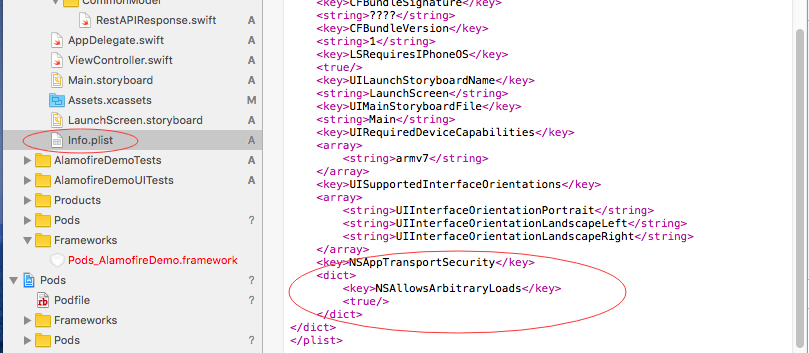【swift学习笔记】四.swift使用Alamofire和swiftyJson
Alamofire是AFNetworking的swift版本,功能灰常强大。
github:https://github.com/Alamofire/Alamofire
SwiftyJSON是操作json的非常棒的开源库
github:https://github.com/SwiftyJSON/SwiftyJSON
接下来我做一个简单的入门小例子,
我使用cocoaPods来管理依赖,需要在Podfile里添加我们需要的两个库
source 'https://github.com/CocoaPods/Specs.git' platform :ios, '9.0' use_frameworks! target 'AlamofireDemo' do pod 'Alamofire', '~> 3.4' pod 'SwiftyJSON', :git => 'https://github.com/SwiftyJSON/SwiftyJSON.git' end
在terminal里运行

cocoapods会为我们自动生成需要导入的第三方库的信息。
关闭工程打开cocoaPods为我们生成的工程文件,编辑通过后就能导入这两个库了
import Alamofire
import SwiftyJSON
因为我们要访问网络,需要在info.plist里开放权限,加入下面的代码
<key>NSAppTransportSecurity</key>
<dict>
<key>NSAllowsArbitraryLoads</key>
<true/>
</dict>

接下来就可以用它Alamofire请求网络使用swiftyJson解析Json
let currRequest = Alamofire.request(.POST, "http://www.yourweb.com", parameters: ["para1":"aaa", "para2":[0,1,2,3], "para3":NSNull()], encoding: .JSON, headers: ["Content-Type":"application/json"]) currRequest.responseJSON{(responseJson) -> Void in print(responseJson.response?.statusCode) print(responseJson.request) print(responseJson.response) print(responseJson.data) print(responseJson.result) switch responseJson.result { case .Success(let value): print("Value:\(value)") print("------") let swiftyJsonVar = JSON(value) print(swiftyJsonVar) case .Failure(let error): print(error) } }
好了这个简单的例子就写完了,还有一个更方便的方法就是用下边这个库,他是集成了上边说的两个库,有时间你可以玩一下
https://github.com/SwiftyJSON/Alamofire-SwiftyJSON
作者:李鹏
本文版权归作者和博客园共有,欢迎转载,但未经作者同意必须保留此段声明,且在文章页面明显位置给出原文连接,否则保留追究法律责任的权利。

